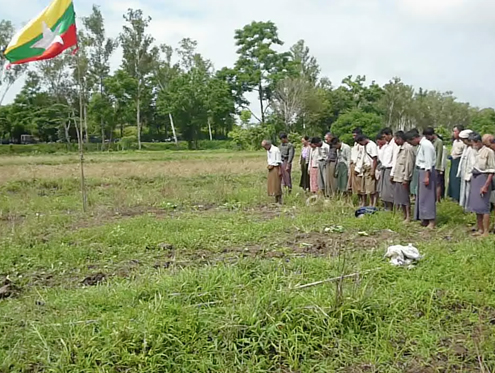Three farmers in Sagaing Division were sentenced to three years in prison on Monday for “trespassing” and about 300 more face charges for staging a plough protest in Kanbalu on farmland that was confiscated by the Burmese military.
In March, the farmers demonstrated for the return of their land in the town of Kanbalu by ploughing the farmland, a common last resort for farmers who had their land confiscated by the Burmese Army during the military regime. The Burmese Army’s 2nd Logistics Battalion confiscated the Kanbalu land in 1997, and is currently operating it as a sugar cane plantation project.
Win Myiny, a police superintendent for the neighbouring Zeetaw village, said that the army immediately pressed charges against the three farmers leading the protest. One of them, Kaung Tun, belongs to a volunteer network that communicates regularly between local farmers and the International Labour Organisation.
“The three farmers faced charges by a captain in the battalion for ploughing the land the army is using for a sugar cane project,” Win Myint said.
Local villagers added that 300 more people face other charges, including for vandalism, which were filed by tenant farmers under the orders of the military.
“The tenant farmers have pressed multiple charges on the protesters per the instruction of the Burmese Army, including Article 427 under the Penal Code for vandalism,” said Kyaw Tun Naing. “I was just a hired tractor driver – I joined the plough protest for a small fee – and now I am facing 22 separate charges.”
After he was sentenced, Kaung Tun was immediately sent to Shwebo prison, while the other two remained in Kanbalu.
Since President Thein Sein’s nominally civilian government came into power in 2011, plough protests have become extremely popular among farmers who have had their land confiscated by the military. The frequency of these demonstrations highlight the prevalent problem of extensive land grabs by the government during the decades of military rule.
[related]



